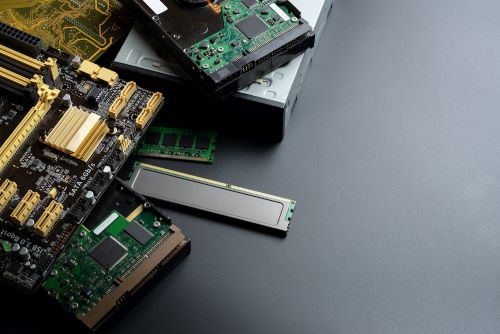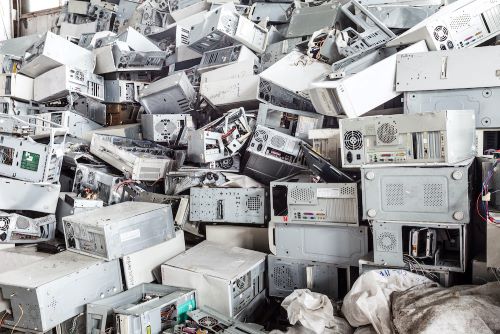
Computers are a huge part of our lives. We use them for work, school and entertainment. But what happens to them when we’re done with them? Many people don’t realise that many of the components of computers can be recycled. In this blog post, we will discuss the recyclable raw materials in a computer and how to go about computer recycling.
What is a Computer Made Up Of?
A computer is a complex machine that is made up of many different parts, including a central processing unit (CPU), memory, storage devices, input/output devices and circuit boards.
The two main components are the processor and the memory. The processor, also known as the central processing unit (CPU), is responsible for executing instructions and performing calculations. The memory is used to store data and programme code temporarily so that it can be accessed quickly by the CPU.
In addition to these two essential components, a computer also includes input/output devices such as a keyboard and mouse, storage devices such as a hard drive or SSD, and various other peripheral devices.
Storage devices are used to store data permanently, even when the power is turned off. Common storage devices include hard drives, solid state drives and optical drives.
Input/output devices allow humans to interact with computers and vice versa. Common input devices include keyboard and mouse, while common output devices include monitors and printers.
All of these different parts work together to process information and perform tasks, and each of them are made up of a number of different raw materials, including plastic, glass, metals such as steel, aluminium and copper, and more.
Which Materials are Recyclable?
Now that we know what raw materials computer equipment is made up of, let’s take a look at which materials in a computer are recyclable.
The majority of the materials in a computer can be recycled. This includes metals, plastics, glass and more.
Metals
Metals such as aluminium, copper and steel within computers should be recycled and reused.
As the world becomes increasingly reliant on technology, the demand for metals such as copper, aluminium, and gold has skyrocketed. A typical computer contains hundreds of components made from these precious metals, and when a computer is no longer functioning, these metals can be recycled and reused.
The process of recycling metals from a computer is relatively simple. First, the various components are dismantled and sorted by type of metal. They are often separated from other materials using a process called magnetic separation.
Next, the metals are cleaned and smelted down to create ingots. Finally, the ingots are sold to companies that use them to create new products.
By recycling these metals from old computers, we can help to conserve resources and reduce pollution.
Plastics
The recycling of plastics has come a long way since the first plastic was invented over 100 years ago. Today, we have the technology to recycle plastics into many different products, including computer components.
In fact, recycling plastics into computer parts is a growing industry, as it helps to reduce the amount of waste that goes into landfills. And, because recycled plastics are often cheaper than new materials, it can also save money.
Plastics from computers can be recycled, but they need to be sorted by type first. There are seven different types of plastic, each with their own recycling symbol. The most common types of plastics used in computer components are polyethylene terephthalate (PET) and polycarbonate (PC).
There are two main ways to recycle plastics into computer parts:
- Shredding: Shredding involves breaking the plastic down into small pieces, which can then be used to create new plastic products.
- Melting: Melting, on the other hand, involves liquefying the plastic so that it can be moulded into new shapes.
Both methods have advantages and disadvantages, but both can be used to create a variety of computer parts from recycled plastics.
Glass
Glass is another recyclable material that can be found in computers. While it is not used as often as metals and plastics, it can still be recycled and reused.
Glass is 100% recyclable and can be recycled indefinitely without losing any quality. In fact, recycling glass is so efficient that it only uses about 30% of the energy required to make new glass from scratch.
The recycling process for glass is similar to that of metals. First, the glass is sorted by type and colour. Then it is cleaned and crushed into small pieces. Finally, the glass is melted down and made into new products.
Recycling glass helps to conserve resources and reduce pollution, just like recycling metals and plastics.
Why Computer Recycling is Important
 Computers are a part of everyday life, both at work and at home. They help us to stay connected and be productive. But what happens when they become outdated or broken?
Computers are a part of everyday life, both at work and at home. They help us to stay connected and be productive. But what happens when they become outdated or broken?
With the ever-growing demand for new electronic equipment, it’s more important than ever to recycle the raw materials used in old computers. Here are just a few reasons why:
Conserves resources
Computer recycling means that many of the metals and plastics used in computer components can be reused to create new products, reducing the need to mine and harvest fresh resources.
Saves energy
Computers are an essential part of our lives, but they can also be very energy intensive. According to the Environmental Protection Agency, the average desktop computer uses about 500 kWh of electricity per year, which is equivalent to the emissions from 800 pounds of coal. Computer recycling can help to reduce these emissions and save energy.
When computers are recycled, the valuable materials in them – such as metals, plastics, and glass – can be reused to make new products. This process requires less energy than making products from scratch, which means that recycling computers can have a significant impact on reducing greenhouse gas emissions.
For example, recycling one million laptops can save enough energy to power 3,500 homes for a year!
Reduces toxic e-waste
In addition, recycling helps to reduce e-waste, which is a growing problem in our increasingly digital world. Computers are filled with toxic substances like lead and mercury, which can leach into the ground and water if not properly disposed of. Too often, they end up in a landfill, where they release harmful toxins into the ground and water. By recycling old computers, we can help to keep these harmful substances out of the environment.
One of the most important reasons to recycle a computer is because of the lead. Lead is a heavy metal that can be extremely damaging to the neurological system, particularly in children. Even small amounts of lead can cause developmental problems and behavioural issues.
In addition, lead is a known carcinogen, so it’s important to keep it out of landfills where it can leach into the groundwater.
Computers also contain other metals, like cadmium and mercury, which can be just as harmful as lead if they end up in the environment.
Creates employment
Finally, recycling provides jobs for workers in the electronics industry and helps to support the economy.
How to Recycle the Materials in Your Computer
Now that you know why it’s important to recycle computers, you may be wondering how to go about doing it.
Here are a few options:
Local recycling centres
Contact your local recycling centre to find out if they accept computers and other electronic equipment.
E-waste recycling programmes
Look for an e-waste recycling programme in your area. Some cities and towns have special electronic recycling programmes to help residents recycle their old computer equipment.
Trade ins
If you’re upgrading to a new computer, ask the retailer if they offer a trade-in or recycling programme for old computers.
Donate
Donate your old computer to a local school or charity/nonprofit organisation. They may be able to put it to good use, or they may know of a recycling programme that can take it off your hands.
Use a Service Like Recycling Your IT
Recycling Your IT provides IT equipment recycling services to small and large businesses, with our computer recycling processes being 100% eco-friendly. We aim to make the process as easy and hassle free as possible and you can be sure that your computers will be recycled in the best possible way.
Here are some of the reasons why using Recycling Your IT is a good idea when it comes to recycling your computers:
- Redundant/surplus IT disposal and recycling
- Secure on/off site data eradication
- WEEE collections
- Fully compliant documentation for your audit trail
- IT asset management
- Mobile phone erasure and asset management
- Licensed movement of electrical waste
- Start to finish traceability including asset tracking
- Re-engineering for reuse
- Dissemination of parts for resale
- Zero landfill policy
- Full confidentiality and security
- Excellent client care to help through the whole process
Why not get in touch today?
As you’ve seen, recycling computers is important for many reasons and there are so many ways to go about recycling your old computers, so it’s not difficult to do your part.
So there you have it! We’ve looked at the recyclable materials in a computer and how to go about recycling them. By recycling these materials, we can help to preserve our resources and protect the environment.
